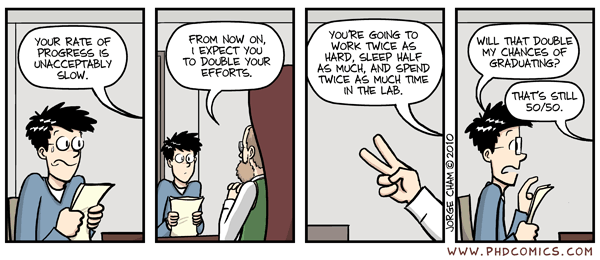In two previous posts I talked about how over or under supervision and CV padding were good ways to make your grad students want to run away from academia. Today I want to rant about discuss how unreasonable expectations can totally f--k up the supervisor-student relationship.
Frustration and disappointment arise when expectations start getting unreasonable or when the student and supervisor have conflicting expectations. I think some examples will help illustrate this nicely:
Supervisor to Student:
Reasonable: "I was reading this paper and I think we should try the analysis method they used. Why don't you have a look at the article and tomorrow we can discuss a plan for our project."
Unreasonable:
Unreasonable: "You know this project that you only have six subjects for and we have no idea how it's going to turn out? I would like you to write a sufficiently vague abstract to submit for this conference... oh, and the submission deadline is in 3 hours."
Reasonable: "I'm going home to visit my family for Christmas, but I'll still be checking email while I'm away if you need to get a hold of me."
Unreasonable: "I'm going on vacation for the next three weeks, so you're going to have to finish that revision without me."
Unreasonable: "If you don't provide me feedback on my manuscript by date X I am going to submit it without you"
In this example, the supervisor can laugh heartily and say, "Like hell you are, that's completely unreasonable. Also, I pay your salary and publication costs." The more serious problem tends to arise when the supervisor's expectations are unreasonable because chances are the student will never speak up about it. No one wants to disappoint their supervisor, and many find it next to impossible to say no to the person that holds their career in their hands.
I have more first-hand experience than I would like with only sleeping a few hours a night and spending entire weekends doing data analysis just so that I could finish all the things my supervisor wanted. In retrospect, I had a pretty awesome supervisor who would have completely understood that I needed more time to complete a project so that I could get some damn sleep. Somehow, the fear of your most important reference-letter-writer thinking you can't handle the workload wins out and you just live on caffeine and chocolate until the work is done (i.e.,
So, what's the solution?
Ideally, honest communication between the student and supervisor.
My department had a fairly comprehensive graduate student handbook that contained general guidelines for what was expected from students and supervisors. For example, it was suggested that it was reasonable for students to expect feedback on their written work in a timely manner (e.g., within two weeks) but also that it was unreasonable for students to expect major manuscript revisions on short notice and should provide plenty of time (e.g., at least one month) for supervisors to provide reference letters. Good advice. Sadly, almost no one in the department ever read it.
Given the power imbalance inherent in the student-supervisor relationship and our tendency as ambitious academics to place unrealistic expectations on ourselves, this is probably not an issue that can be easily solved. But I do hope that when I have a lab full of students (soon, hopefully!) that 1) I am clear about my expectations of them, and 2) I am mindful of how difficult it will be for them to tell me when my expectations are insane and so try to keep my expectations reasonable. I'm sure I will fail miserably at this from time-to-time, but I think it's a good thing to strive for.

No comments:
Post a Comment